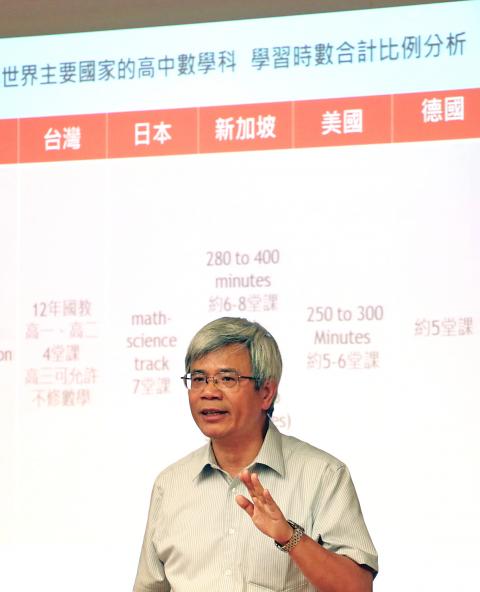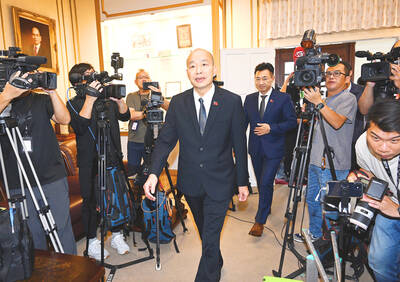Nearly 100 members of Academia Sinica have signed a petition against halving the required number of mathematics credits for senior-high school students as proposed in the draft 12-year national education program guidelines.
They said the reduced course load would weaken the nation’s competitiveness.
Four mathematicians who are also members of Academia Sinica held a press conference at National Taiwan University (NTU) in Taipei yesterday to announce that the petition, which calls on the government to reconsider its plan.

Photo: CNA
The petition has been signed by 93 academicians, including renowned historian Yu Ying-shih (余英時) and former Academia Sinica president Lee Yuan-tseh (李遠哲).
“Mathematics is widely recognized as a fundamental tool of science and technology” and a “math course is not only about attaining mathematical knowledge, but, more importantly, about training one in logical thinking and deductive ability,” the petition says.
Under the draft guidelines, the number of required math credits would be cut from 24 to 12 hours.
Math courses will only be required up to the first semester of grade 11 and become electives afterward, but “no country only requires senior-high school students to take math courses until the 11th grade,” NTU math professor Lin Chang-shou (林長壽) said.
“Allowing students to have one-and-a-half years where they do not have to take a math course could be seen as the state giving up on them,” he said.
While students from better-off families might be able reinforce their math education, students from disadvantaged families will be deprived of adequate education that could help them enter better universities, Lin said.
Yau Shing-tung (丘成桐), a former Harvard University professor and a Fields Medal winner, said the plan would damage the cultivation of Taiwan’s talented youngsters, because mathematics is the basis for excelling in science, engineering and other disciplines.
Yau showed journalists a letter from a Harvard professor about Taiwan’s plan to reduce the math course requirement, which reads: “that is shocking. In the US, high-tech companies are complaining that math education is too weak … have they considered what downgrading the role of math in high schools will do to Taiwan’s economic health?”
“Mathematic ability usually takes a long time to build up, so it is harder to reinforce the students’ ability after they enter college,” Harvard professor Yau Horng-tzer (姚鴻澤) said.
“But as more aspects of life are being digitalized, mathematic ability is becoming ever more important in various fields, including finance, biostatistics and big data,” Yau said.
National education should at least provide students with the basic ability to understand mathematics, and good mathematic skills also create high value-added industry for the nation, because the global trend is toward more dependence on digitalized technology, Yau said.
The petition’s supporters believe senior-high students should have at least four required credits of math each semester, two sets of math education programs designed for senior-high students of different learning orientations, and at least one math class per day for elementary and junior-high students, Lin said.
A mechanism to enhance the training of mathematics teachers to ensure teaching quality is also key, Lin said.

NON-NEGOTIABLE: The US president’s action ran counter to one of the US’ ‘six assurances’ on not consulting China about arms sales to Taiwan, US lawmakers said US President Donald Trump’s admission that he is discussing arms sales to Taiwan with Chinese President Xi Jinping (習近平) is “alarming and a blatant violation of US policy and the six assurances,” US Representative Ro Khanna said on Tuesday. Trump on Monday said he would decide soon on whether to send more weapons to Taiwan, after Xi warned him not to do so. “I’m talking to him about it. We had a good conversation, and we’ll make a determination pretty soon,” Trump told reporters aboard Air Force One when asked about warnings raised by Beijing during a phone call with Xi over

VACILLATING? Some US officials are concerned that Trump’s April visit to Beijing might be affected if Washington pushes through additional weapons sales to Taiwan A major US arms sales package for Taiwan is in limbo following pressure from Chinese President Xi Jinping (習近平) and concerns among some US officials that greenlighting the deal would derail US President Donald Trump’s upcoming visit to Bejing, the Wall Street Journal (WSJ) reported on Wednesday. Trump on Monday said that he would decide soon on whether to send more weapons to Taiwan, after Xi warned him not to do so. “I’m talking to him about it. We had a good conversation, and we’ll make a determination pretty soon,” Trump told reporters aboard Air Force One when asked about warnings raised

OPTIMISTIC: The DGBAS sharply upgraded its GDP growth estimate from 3.54 percent to 7.71 percent after the Taiwan-US trade agreement signing and given AI optimism The US imported more from Taiwan than China for the first time in decades, as US President Donald Trump’s tariffs reshape trade flows while a global boom in artificial intelligence (AI) fuels demand for tech products. US purchases of goods from China plunged almost 44 percent in December last year from 2024 to US$21.1 billion, US Department of Commerce data showed on Thursday. By contrast, shipments from Taiwan more than doubled during the same period to US$24.7 billion. The soaring Taiwanese shipments to the US reflect the huge expansion in supplies of chips and servers for AI companies, which has completely changed

TEAMWORK: All parties should prioritize national defense and key security issues, which requires cooperation and long-term, stable support, the DPP’s Chen Pei-yu said A proposed NT$1.25 trillion (US$39.66 billion) special defense budget would be a top priority for the Legislative Yuan when it reconvenes after the Lunar New Year holiday, Legislative Speaker Han Kuo-yu (韓國瑜) said yesterday after a group of 37 US lawmakers sent letters to Taiwanese politicians expressing concern over the stalled budget. Chinese Nationalist Party (KMT) members Han and Deputy Legislative Speaker Johnny Chiang (江啟臣) in a statement said they would help party caucuses deliberate about the special defense budget, adding that they value open, candid and sincere exchanges with the US Congress and take US lawmakers’ concerns seriously. Taiwan-US relations are